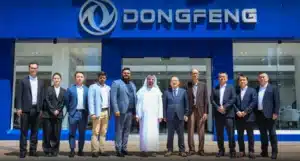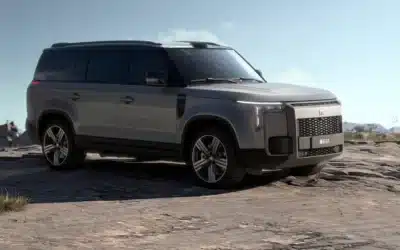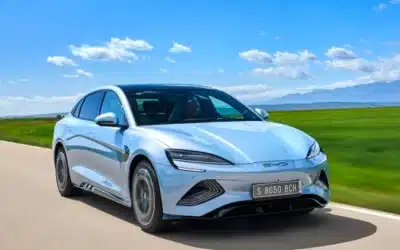
Africa is emerging as a critical node in the evolving electric vehicle (EV) ecosystem. Long seen as just a consumer market, the continent is now gaining recognition as a hub for innovation, manufacturing, and resource development. Countries like Nigeria and Kenya are charting different but equally dynamic paths, attracting investment from global EV players while nurturing homegrown solutions.
Nigeria: Driving Industrial Growth Through EV Partnerships
In Nigeria, the EV agenda is rapidly becoming intertwined with industrial policy and international diplomacy. The federal government is advancing a high-stakes partnership with Chinese automotive firm BAIC Motor to introduce battery swap technology—a move designed to overcome one of the most persistent barriers to EV adoption: charging infrastructure.
This initiative is backed by a ₦151.9 billion funding package aimed at scaling up electric buses, tricycles, and charging stations, especially in areas underserved by public transport. The scheme is part of Nigeria’s Renewed Hope Agenda, which seeks to align economic growth with environmental sustainability.
Battery swapping, already mainstream in China, offers significant logistical and economic advantages. It cuts charging times and enables centralised battery management—critical benefits in a country where energy access is uneven and electricity grids face chronic strain. China’s Nio, for example, operates more than 3,000 swap stations across China, providing a working model that Nigeria now seeks to emulate.
Meanwhile, China’s involvement goes far beyond technology transfer. Joint ventures are also targeting domestic EV manufacturing. In recent months, Chinese companies have launched EV production initiatives in Nigeria, underpinned by bilateral agreements and mineral wealth. According to Nigeria’s Minister of Solid Minerals Development, Dr Dele Alake, the country is “strategically positioned to lead in EV manufacturing” thanks to its substantial lithium reserves—a key input in battery production.
From Raw Materials to Value Addition
China’s Ambassador to Nigeria, Yu Dunhai, has framed this cooperation as developmental rather than merely transactional. In his words, “This is more than trade; it’s about development” . Nigeria’s shift from being an exporter of raw lithium to a processor and manufacturer of lithium-based products is part of a broader policy shift aimed at industrial diversification.
To that end, a $150 million lithium-ion battery manufacturing plant is already underway, while additional Chinese investment commitments exceed $2 billion across vehicle and technology sectors . In Lagos, CIG Motors has begun assembling EVs locally under a public-private partnership model, producing 2,000 vehicles annually as a proof of concept.
Still, Nigeria’s efforts are not without challenges. Illegal mining and unregulated extraction remain serious concerns. Reports of environmental degradation and child labour in informal lithium mining sites have prompted tighter enforcement, with both Nigerian and Chinese officials pledging zero tolerance for malpractice . As the EV supply chain becomes more prominent, scrutiny of ethical sourcing will likely intensify.
Kenya: Innovation from the Ground Up
While Nigeria’s EV push is driven by top-down industrial strategy and global partnerships, Kenya’s progress is fuelled by startup innovation and local adaptation. Companies like Rideence and Ebikes Africa are developing new models for mobility that address both financial barriers and urban challenges.
Rideence offers a leasing scheme that allows drivers to rent compact EVs for $25 per day. It’s a model that sidesteps high upfront costs and helps drivers keep a larger share of their earnings. Yet it comes with trade-offs—after two years of payments, drivers still do not own the vehicles .
Ebikes Africa, on the other hand, offers ownership through instalments, with electric bikes priced at $760 and paid off over eleven months. This approach has empowered many first-time workers, particularly in the gig economy, where e-bikes are used for delivery and transport services. Their models also include electric wheelchairs adapted for Kenya’s rough terrain, underscoring how innovation is being tailored to local needs.
Chinese EV hardware plays a critical role here too. Both Rideence and Ebikes Africa rely on affordable Chinese components and batteries. But they also face a tough regulatory environment. Import taxes can inflate EV costs by over 50 percent. While Kenya’s 2023 Finance Act sought to ease the burden, new proposals in the 2024 Finance Bill threaten to reverse these gains. The Electric Mobility Association of Kenya has warned that these changes could jeopardise the industry’s fragile progress.
Local Solutions, Global Relevance
Africa’s dual-track approach – top-down manufacturing in Nigeria and grassroots mobility in Kenya – highlights the continent’s growing relevance to the global EV sector. These efforts are not uniform, nor are they without friction. Nigeria must reconcile rapid industrial development with environmental and ethical oversight. Kenya’s startups are agile but constrained by policy uncertainty.
What connects both, however, is a clear shift: Africa is no longer waiting on the margins of the EV transition. It is taking part—through partnerships, innovation, and an increasingly active role in shaping supply chains and business models.
As global EV demand grows, so too will attention on Africa’s role in providing critical minerals, manufacturing capacity, and scalable solutions tailored to the Global South. Whether through battery swap pilots in Abuja or pay-as-you-go e-bikes in Nairobi, Africa is making its presence felt.
And if current momentum holds, the continent may soon become not just a beneficiary of the electric revolution, but one of its architects.











